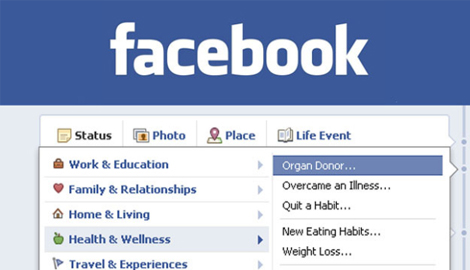On the morning of 8 May, Australians woke up to new possibilities on Facebook. With a Timeline profile, Facebook-users can now choose to share even more information about themselves with the public.

By clicking into the Life Event section of your Timeline, you can now alert your family and friends to your decision to donate your organs. This addition was made available on 30 April to American and British users, and is creating a lot of media attention for the great possibilities it brings with it.
Doctors around the world are hoping that the additional setting will encourage users to consider organ donation and Dr. Andrew M. Cameron, the surgical director of liver transplantation at Johns Hopkins Hospital, even estimated that millions of people could shift their donation status overnight.
But, could there be a hidden agenda in this setting, and will it really ‘eliminate’ the problem of organ donor shortage, as suggested?
Mia Garlick, head of policy and communications for Facebook Australia and New Zealand, said the tool was designed to get people talking to their family and friends about organ donation in a bid to increase the number of registered donors.
‘We believe that by simply telling people that you are an organ donor, the power of sharing and connecting can really play an important role in increasing organ donation rates,’ she said.
Fortunately, the Timeline addition, or awareness campaign as it clearly is, has already had a positive outcome. The USA has previously averaged about 506 new organ donor registrations per day, but since Facebook introduced this tool, more than 24,000 people have registered to donate their organs, according to Donate Life America.
Facebook hopes that this move will create peer pressure to nudge more people to add their names to the rolls of registered organ donors, and that an official status update will decrease the number of families vetoing a loved one’s decision.
Lucy Kippist of The Punch writes to ‘think of it as a gentle nudge, prompt or pressure on family and friends. From the minute you click that status button they’ll understand that it is your decision to donate your organs and hopefully, that will make it harder for them to deny that wish.’
However, if being registered and having a ‘organ donor Y’ on my driver’s license is not enough to stop my family from preventing my wishes of organ donation, I highly doubt that putting it on my Facebook profile is going to achieve it.
Adding peer pressure into the mix can be quite risky, and may result in people doing this ‘because all my friends are.’ This is a big and important decision – one that you should take with your family and close ones on the basis of your heart, not your news feed.
It’s important to add that clicking your status option won’t make your decision legitimate; users still need to register as an organ donor with the state they live in – I wonder if there will be more ‘organ donors’ on Facebook than in real life?
Besides sharing what will happen to your organs after your passing, the new Timeline dimension enables you to publicize when you got your first set of glasses, what bones you have broken, if you have adapted to new eating habits, lost weight, and basically all other details about your life.
It seems a bit invasive to me, and could very well end up being another online popularity contest – who is eating the right things, has made the right decisions and is the healthiest?
Do we really need to know all these things about each other?
Dr. Cameron explains that previous efforts to encourage organ donation have struggled, since the issue is sensitive and personal and because the decision is made at the department of motor vehicles, where many people may not want to focus on the prospect of dying.
I don’t see how this addition to Facebook is any different – the final decision is still going to be made at the department of motor vehicles. However, Dr. Cameron is right – the issue is sensitive, as are many of the other additions to Timeline, and maybe, just maybe, they should remain personal.
 Anne Nielsen is third-year Bachelor of Media Studies student at La Trobe University. She is currently on exchange from Aarhus University, Denmark, and is upstart’s deputy-editor. You can follow her on Twitter @AnneRyvang.
Anne Nielsen is third-year Bachelor of Media Studies student at La Trobe University. She is currently on exchange from Aarhus University, Denmark, and is upstart’s deputy-editor. You can follow her on Twitter @AnneRyvang.






